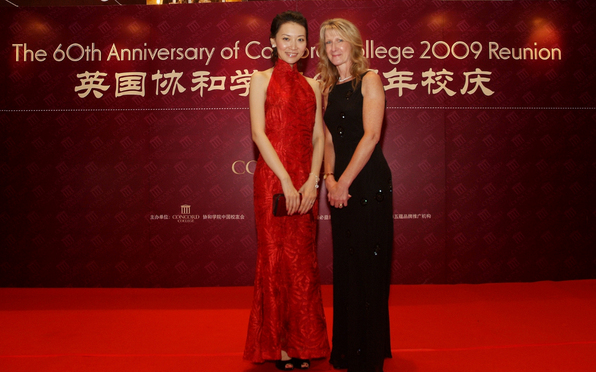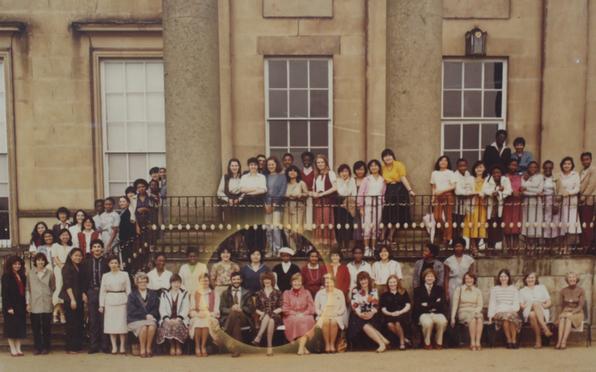Barbara Belfield-Dean Retires After 43 Years at Concord
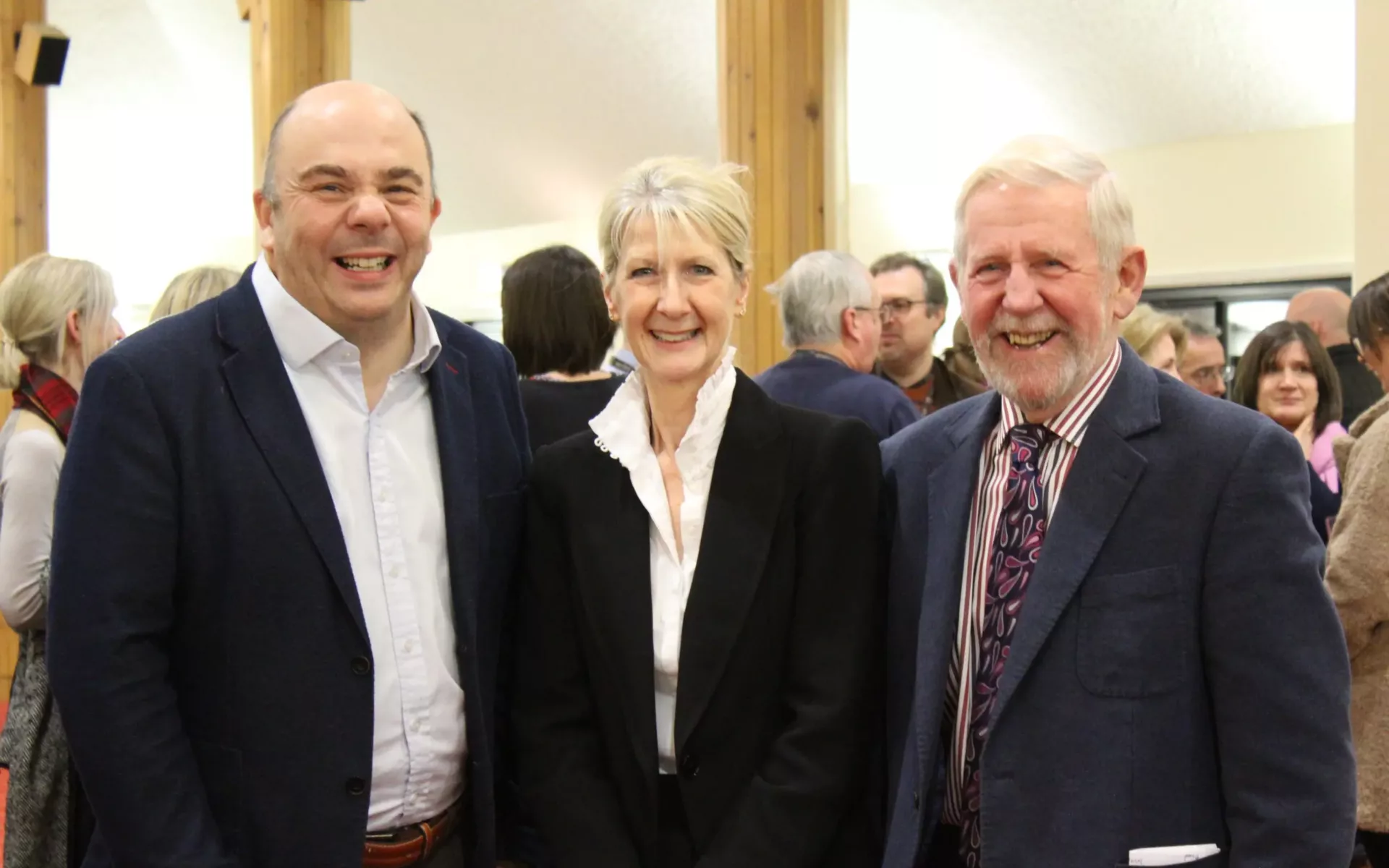
Barbara Belfield-Dean has just retired as Bursar of Concord College where she was also Company Secretary & Clerk to the Trustees. Having been at the College since 1979, the majority of Concordians will be aware of her role, if not the enormous influence she has had on the development, growth and success of the College over the last 43 years.
Before leaving, Barbara managed to find time (while busy handing over the reigns to her successor) to reflect on her career with a fascinating insight into what made Concord the outstanding College it is today.
“You will read much below not only about Barbara’s extraordinary service to Concord over nearly half a century, but also her attention to detail and appreciation of the importance of excellence in everything that we do as a school. These are crucial qualities to be successful as a bursar and have cemented her legacy at Concord forever. However, Barbara’s most important quality is that she never, ever forgot that the most important thing in a school is its students. She put them at the centre of all decisions with compassion and great care. That alone lifted her from an excellent bursar to a great one”. – Dr Michael Truss, Principal.
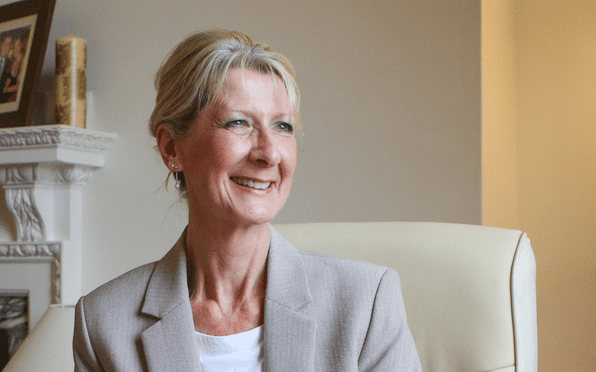
Before you read our in depth interview with Barbara, here are some ‘Barbara facts’:
- Barbara joined Concord in 1979 as PA to Gill Hood who was Principal of the girls’ branch of Concord at Attingham Park, a role which also involved supporting the students and even performing in concerts and at events!
- It was very unusual to have a female bursar in the UK when she was appointed to the role by Tony Morris in 1987.
- She introduced computerised accounting and has continued to develop our systems, processes and procedures ever since.
- Responsible for project managing new buildings, she has commissioned projects worth over £44m, including property and land acquisitions of over £5m and commenced plans for developments in future years of over £37m. This was all with the aim of developing the campus to provide facilities of the highest quality and improve students’ overall experience.
- Barbara loves being creative, working with architects, M&E consultants, structural engineers, surveyors and more. She has studied interior design with the aim of creating a positive, enjoyable and supportive environment in a beautiful setting, combining contemporary and historic elements.
More than her roles suggest, Barbara touched, and still touches, the lives of students in a wide ranging and positive way.
Q) You have worked with four Principals (Gill Hood at Attingham, Tony Morris, Neil Hawkins and recently Michael Truss). In your view what has tied Concord together over this time period of big change? In other words, what do you think is at the heart of Concord?
Concord is quite unusual in having had so few Principals during the 43 years I have worked at the College as most schools would have a change of Head every five to ten years. However, as we know, Concord is unique in many ways, one being our wonderfully rich and vibrant international culture, and this has been an important and constant focus.
The students, their care and development, should be at the centre of every school and this is certainly the case at Concord, and this goes deeper at Concord with the individual and their own uniqueness being at the heart of what we do. We see incredible talent in our students every year which is wonderful to witness and the whole school benefits from the diversity this brings.
Respect, tolerance, celebrating differences and being kind to one another are practices which are important throughout the Concord community and these provide the strength to successfully manage change.
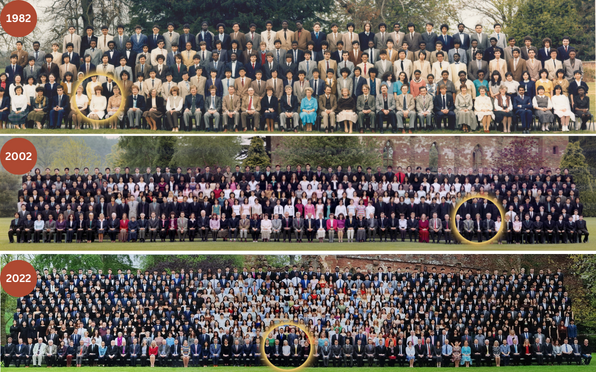
These three photos were taken 20 years apart- the school has grown and Barbara is in the front row on all of them.
Q) You mentioned in your retirement speech in December that when you became Concord’s Bursar there were not many women in that role in the UK. Can you tell us any other ways Concord may have been a trailblazer in private education over the last 40 years – things this College was doing that others weren’t?
I am not sure that I can class these as trailblazing, but there are two areas which I believe provide a significant benefit to our students which are not in place in many other schools.
The first is Saturday testing – which the students might occasionally groan about, but which they come to value because it gives them regular exam practice as well as identifying areas of weakness in their studies. Many students find exam conditions stressful, but by having regular tests under similar conditions, this helps them feel more comfortable and better able to focus.
The second is our amazing catering provision. The majority of schools will have outsourced their catering to a contract catering company and, while I am sure they provide good service, they will be unable to compete with our own, in-house team in the selection and quality of food we have on offer and we are better able to control cost and quality and provide better value for money.
The standard to which our Chefs and catering team work is extremely high – better than many restaurants, not just schools – we are so lucky (and this is something I will seriously miss in my retirement!).
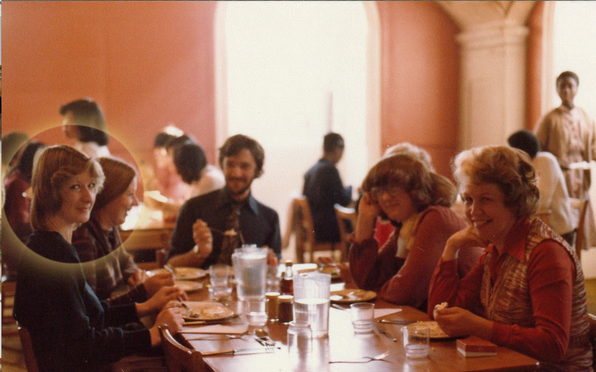
Barbara on the left, with Mrs Hood on the right, eating in the dining room at Attingham Park.
Q) What was the first Concord building project you were involved in, and can you tell us more about managing your first project?
The first building project I was involved in was our Performing Arts Centre, the Morris Building, in 2000. It introduced me to the various roles within the design team and illustrated some of the challenges of construction.
The first project I managed was the West End student recreation centre in 2007/08. This was a new build and we wanted it to provide the students with a multi-functional facility, to include a coffee bar/internet café, disco, football/pool tables, lots of soft seating, an outdoor performance space, etc, which could also be used as a staff training centre/meeting venue and function space, together with a storage facility for furniture and students’ luggage, which we created by including a basement.
The building needed to have acceptable design elements to gain planning approval, hence the shape of the building, with the west elevation being much lower than the east to reduce its dominance when looking across from Main Hall and with a Sedum roof to reduce its environmental impact. Heating, ventilation and lighting designs were important key factors.
It was an interesting project because of its design elements and a statement building in improving recreational facilities for the students. It was exciting to work on.
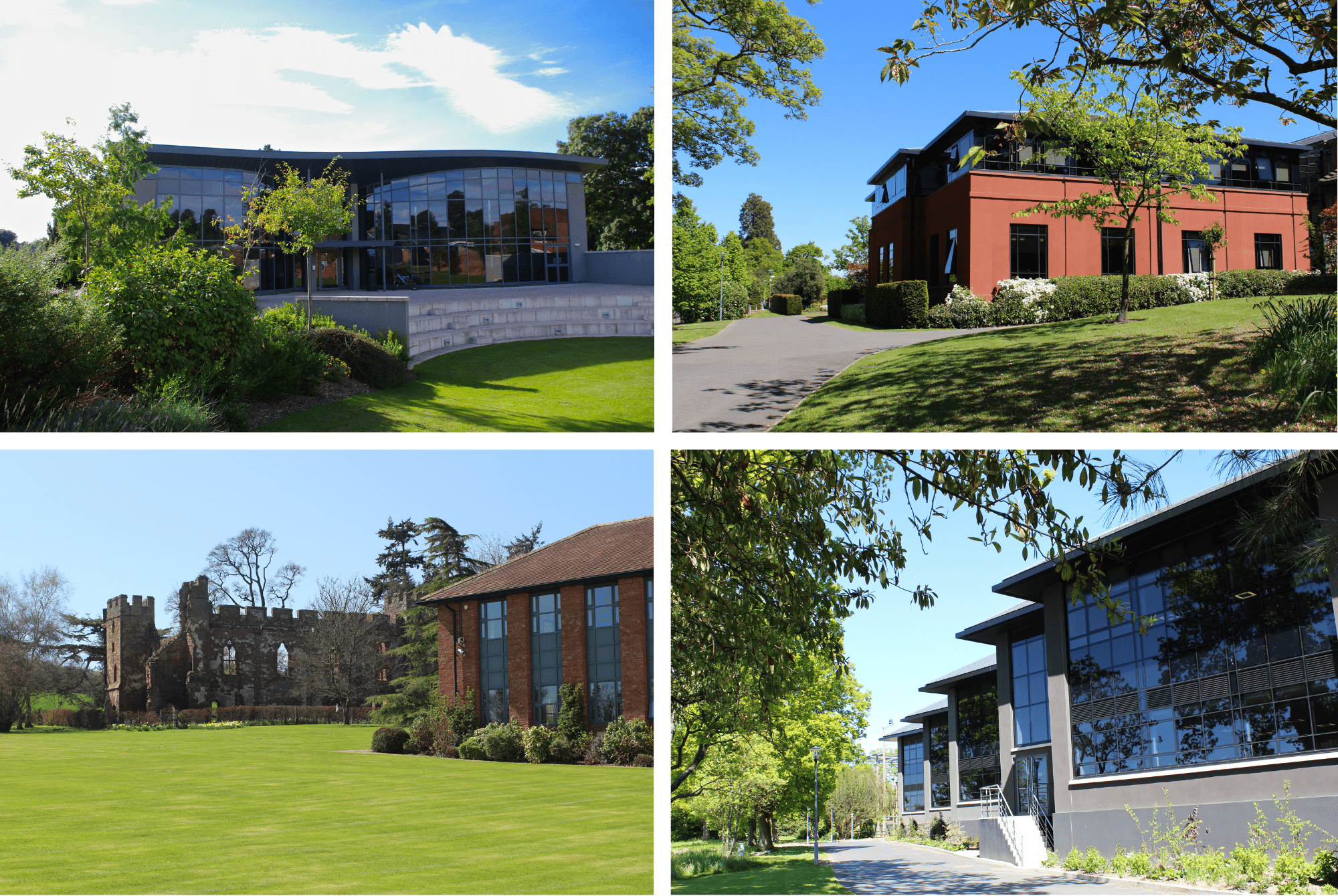
Clockwise from top left: West End, Jubilee Building, Science Building, Castle Block
Q) You famously have a very high attention to detail and also an eye for aesthetics.
Can you give us a few examples of small things you have implemented at Concord that others may not notice – but that you hope will make a positive impact on the student experience?
The small things are those that we take for granted, but which make for a nicer environment in which our students live and study, and also benefit the staff and their working environment. For example, high standards of cleaning, high quality furniture and soft furnishings, proactive maintenance and decoration, proactive grounds care to maintain this beautiful environment. If we maintain high standards these are generally very much appreciated and will generate a positive attitude by all in the care of what we have around us.
Each summer I used to undertake a full site survey to identify what needed to be improved ready for the start of the new academic year. I would go into every room in every building and make notes which I then transferred into a spreadsheet with details for repairs, redecoration, furniture replacements, notice boards to be recovered, carpets, bedding and curtains, etc. I wanted students to enter Concord on the first day of their new term feeling that their surroundings were of a high standard and that we cared. Other members of the team now do this, carrying on the good work.
I also conducted a full time-and-motion survey for cleaning every area of the College and encouraged training so that everyone worked to the same high standards and followed the same procedures. Consistency is so important. I encouraged members of the team to look at their areas through the eyes of a visitor – what would they notice, the negatives and the positives.
We can always improve what we do and this was a constant message from me – what can we do better and how can we work smarter. I also believe that a job done well brings greater job satisfaction and encourages further improvement. It can also lead to new opportunities.
Q) How important is it to you to live, work and study in a beautiful environment?
I love the countryside and appreciate beautiful buildings, so spending so much of my life at Concord has been an utter joy. It is something that I have never taken for granted and I have worked hard to try to ensure that we have enhanced our facilities while in sympathy with and protecting the historic elements. I appreciate that not everyone will feel the same as I do, but I hope that even those who might prefer the buzz of a city, may appreciate the beauty of our surroundings and benefit from them.
Q) What was your favourite project from the last 40 years and why? What are the legacies of this project?
I have loved working on all the projects, but my favourite has to be the new Science building. This provided the opportunity of setting the bar even higher with regard to the quality of facilities we provide and it has been commented by a number of visiting academics that it is one of the best science teaching facilities in the country. As far as its legacy is concerned, I hope that it will continue to provide an inspirational teaching and learning environment for many years to come. It was a very interesting project to work on and provided new design elements for me to explore and develop. It is the attention to detail which I love so much, in any project.
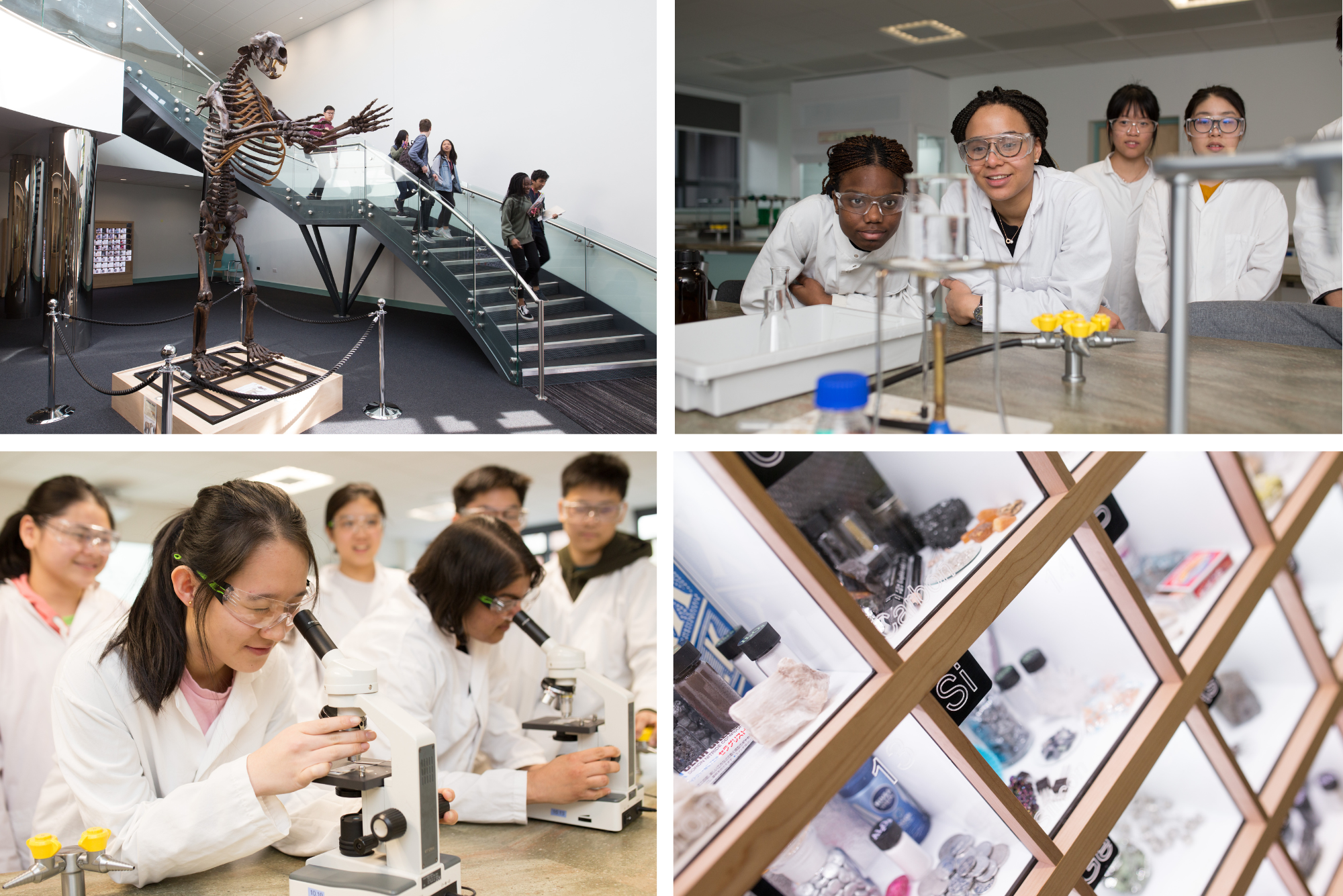
The Science Building- Barbara’s favourite project
Q) You have championed Concord student bursaries – please tell us why this is important to you and to the Concord community.
Concord is a college for academically gifted students and our aim is to provide an all-round education which helps them develop to their fullest potential. We rely fully on charging fees, we have no other form of income, other than small sums from incidental activities. However, because we are a registered charity our only beneficiaries are our students – all of any surpluses we manage to achieve in any year are reinvested in our facilities for the benefit of the students who study with us.
Unfortunately, not all academically gifted students have families who are able to pay the fees that we charge and our bursary scheme is in place to enable such students to benefit from all that Concord has to offer, to reach their full potential, to gain entry to top universities, to forge successful professional careers and contribute positively to society. It is a gift the College can give which can make an enormous difference to the life of a student and their family and it is a privilege to be involved in this.
Q) What are the biggest challenges facing bursars in private education in the UK today?
Two significant challenges are sound financial management, particularly in the current economic climate, and regulatory legislation. Schools are businesses and need to be financially secure and strategic planning is essential to protect against potentially damaging challenges, which can occur at any time. Covid was a perfect example. Regulatory legislation is very onerous for independent schools, but compliance is essential and everyone has a part to play in this. Robust communication, policies and procedures are key.
Q) Have there been any positive legacies from things outside our control such as COVID-19?
I think when anything happens which is outside our control, it is always helpful if you can identify something as a result which will have a continued positive impact. With regard to Covid-19, one positive is a greater awareness of infection control within our community which will, hopefully, reduce the spread of general ailments such as winter coughs and colds. It is a high price to pay though, when considering those who suffered with lasting effects or who lost loved ones and I do not want my answer to trivialise this.
Q) A silly one! Can you share any ideas that never got off the ground because they were too far-fetched or funny?
There are two things which I have suggested (without seriousness) – giving the students microchip tracking devices so that we can find them on campus when they fail to register, and building a suspended monorail around the campus (similar to Alton Towers) to enable students and staff to move around while protected from the elements.
Q) What is the most fun you had at Concord?
I would say probably participating in various end of term fun shows and the fancy dress Christmas parties for staff and students which we used to hold. It was always great fun for the students to see you in a completely different light.
Q) In an alternate universe where there was no Concord, what would have been your ideal career and why? Could you have been a teacher?
There are probably a number of professions I would have seriously considered and thoroughly enjoyed and these include:
The law – I would have loved to have been a barrister. I love working on legal matters and the attention to detail which is required, case law, legal arguments, etc
Commercial or investment banking – I have always had a love of this area of work
Teaching – inspiring others and helping them to achieve
